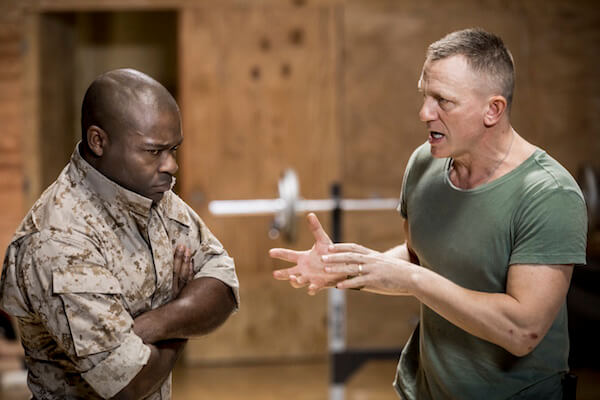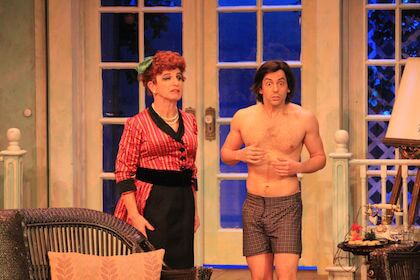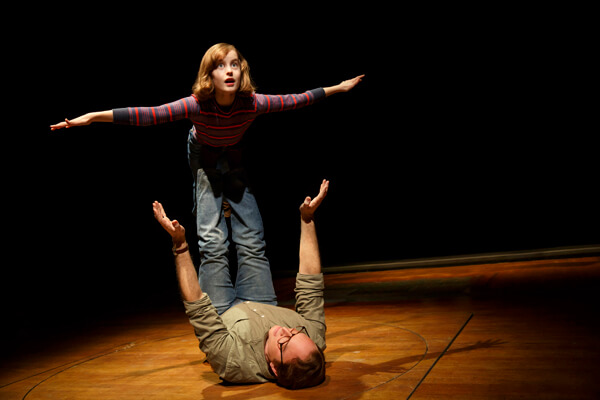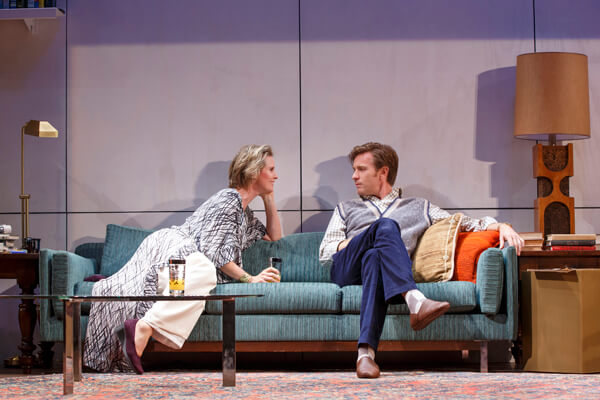It’s hard to believe, but Sebastian Stan and romantic lead co-star Maggie Grace will leave audiences cold in “Picnic.” | JOAN MARCUS
Director Sam Gold is not big on giving his actors a lot of room — literally, in terms of playing area. In his recent production of “Look Back in Anger” for Roundabout, he created a narrow space way downstage with a solid wall behind the actors. This was supposed to express the claustrophobia of the characters’ lives in lower class London. In reality, it created a clumsy awkwardness in the performance that suffocated the play with a pretentious concept.
Sex and Longing: When they’re missing, “Picnic” becomes a washout
In his mounting of the William Inge chestnut “Picnic,” also for Roundabout, Gold’s done the same thing, dropping a wall of what looks like corrugated metal behind the realistic middle-class houses and backyards of 1950s Kansas, this time in an otherwise nicely detailed set by Andrew Lieberman.
This feint of expressionism in a play steeped in realism makes the architecture of the Owens home, the centerpiece of the set and the action, impossible — severing a good third of it from behind — even as it forces the actors into a confined playing space. Presumably, these close quarters are meant to ratchet up the heat of suppressed loneliness and sexuality at the heart of the story, and the wall is supposed to represent an intractable society imprisoning these quietly desperate people.
As before, this facile conceit constricts the world of the play without illuminating it. Unfortunately, that’s only part of what plagues this production, which, for the most part, is as enervating as a heat wave on the Plains.
The play unfolds in the backyard shared by Flo Owens, a single mother with a gorgeous 18-year-old daughter Madge and a smart but homely younger daughter Millie, and Helen Potts, a single woman of a certain age who cares for her mother. At the opening of the play, Hal Carter appears, doing chores for Helen. Hal is a prototypical character from the ‘50s, a man/ boy who has gotten through life on charm, athletic ability, and sex appeal, but as he becomes a man his essential fecklessness has caught up with him and he’s unprepared for the mantle of adulthood. He is reduced to doing odd jobs or working for food.
Madge, who is working at the dime store and feels trapped in Kansas, is dating Alan Seymour, a rich college boy home for the summer who can’t believe Madge would give him the time of day. Also on the scene is the Owens’ boarder Rosemary Sydney, a teacher who is bent on marrying her reluctant gentleman friend Howard Bevans.
As the play is written, Hal’s arrival upsets this prairie home-cum-stasis. The instant sparks between Hal and Madge are supposed to be suffused with youthful carnality and — played out in full view of the neighborhood — serve as a catalyst for the older women to focus on their lives and loneliness. Hal, it turns out, is a former fraternity brother of Alan’s, but flunked out of school, tried Hollywood, and is now rootless. Still, Hal and Madge find in each another the balm for their troubled souls and their insecurity that physical beauty is all they have. (The Woody Allen quip “We were together because our neuroses meshed perfectly” comes to mind.)
When Madge and Hal have an illicit tryst rather than attend the town picnic, the consequences are devastating. Alan essentially runs Hal out of town, and, against the advice of the older, wiser, but frustrated women, Madge must follow, whether to her salvation or her destruction.
“Are we loveable?,” Inge’s characters ask, a theme that makes the play relevant today, even with its dated language. And if we are not loved, are we fully alive?
Ironically, this production sinks because it lacks the very sexual spark it tries so hard to sell. Sebastian Stan as Hal has an impressive physique, but he lacks the darkness at the center of Hal’s character, the anger and frustration that drive him, and his resentment toward Alan and the world he feels has wronged him. Instead, Stan’s Hal bounces around like a puppy with all the sexuality of a member of a boy band, seemingly happy to tag along to the town picnic with Millie rather than Madge. Adorable? Yes, though largely antiseptic. Dangerous and sexy? Not even close.
Worse yet, Stan and Maggie Grace as Madge generate absolutely no heat. Their clinches are at best mechanical. Grace, too, gives a shallow performance that often borders on the affectless, never exploring what drives Madge and why fireworks erupt when Hal enters her life.
The actors in supporting roles fare better. By far, the evening’s highlight is Elizabeth Marvel as Rosemary. As with everything she does, Marvel delves deeply into Rosemary’s fears and frustrations, creating an integrated, believable character. Her third act scene with Reed Birney as Howard — who gives a detailed performance as a man feeling forced into choices he’s not prepared for in marrying Rosemary — is the best thing in the show, really the only time we feel her unvarnished need and the sadness she’s subdued thus far. Together, Marvel and Birney, with their heart-wrenching honesty, nearly change the focus of the play to the older characters’ tribulations.
Ellen Burstyn as Helen Potts gives a touching portrait of a woman deserted years before by love and beauty, but not by her longing. Madeleine Martin is strong as Millie, the younger sister who knows she will never be a beauty and sets her sights on a larger, if passionless, life. Mare Winningham as Flo is solid and appropriately maternal.
The humanity found in the supporting roles is what is missing from the central performances, and the production cannot overcome this shortfall, even by moving the whole operation downstage to force it on the audience. Mechanical tricks never compensate for absent characters; cold devices fail when what’s called for is heat. This is one “Picnic” I’d gladly have missed.
PICNIC | Roundabout Theatre Company at the American Airlines Theater | 227 W. 42nd St. | Tue.-Sat. at 8 p.m.; Wed., Sat. at 2 p.m.; Sun. at 3 p.m. | $42-$137 at roundabouttheatre.org 0r 212-719-1300



































